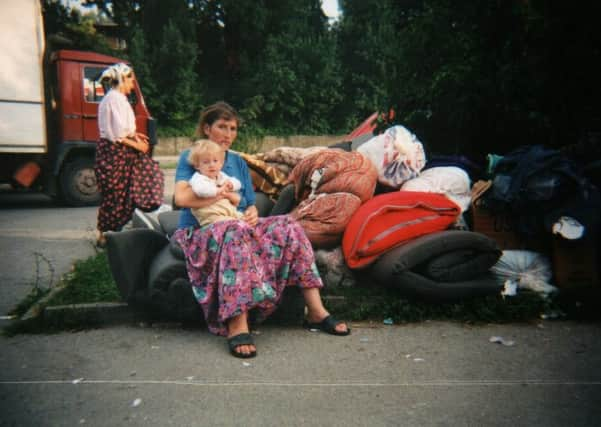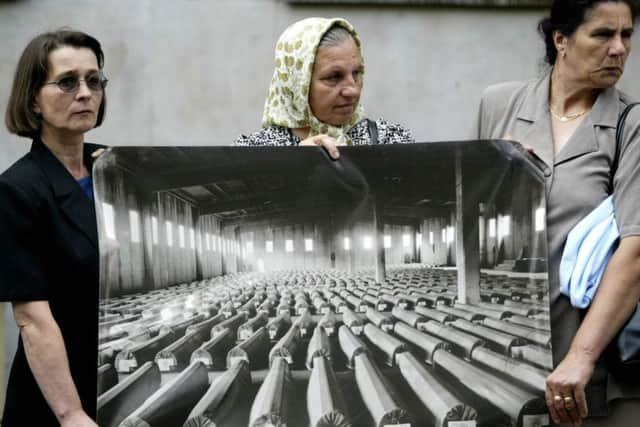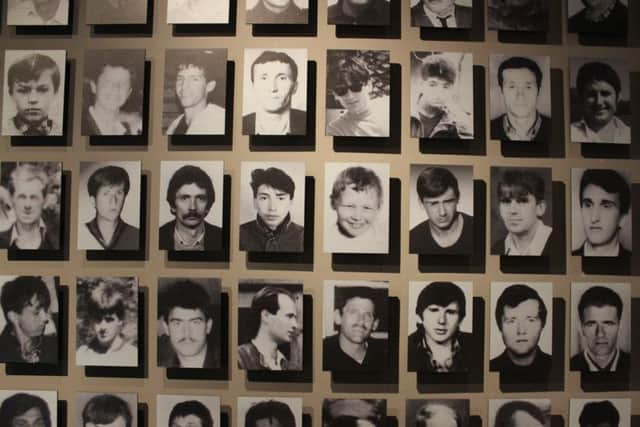Plans to mark genocide of Muslims at Srebrenica


This year marks the 20th anniversary of the genocide, with plans for a high-profile service in St Giles’ Cathedral in Edinburgh on 10 July attended by First Minister Nicola Sturgeon.
UK charity Remembering Srebrenica established its Scottish board this year, chaired by former Moderator of the General Assembly of the Church of Scotland the Very Rev Dr Lorna Hood and including Ruth Davidson, MSP, leader of the Scottish Conservatives.
Advertisement
Hide AdAdvertisement
Hide AdAnother board member, chairman of the Scottish Police Federation Sergeant David Hamilton, 43, drove relief lorries to Sarajevo during the siege of the city by Bosnian Serb forces.


As an aid worker in Bosnia during the 1992-95 war, he delivered aid on behalf of Edinburgh Direct Aid to communities across Bosnia and was in the city of Tuzla shortly after the Srebrenica genocide in 1995. He remembers the sight of “rows and rows of women and young children” in the refugee camps, which had been hastily constructed to house those who had been deported from Srebrenica.
“It struck us all that something quite wrong was taking place. The refugee centres were full of just women and children,” he said.
“It was some weeks later that the full horror of what had taken place emerged. To think that something as horrific as that can take place on the edge of Europe just 20 years ago is truly chilling. The memories will stay with me for life.”
The Srebrenica enclave had a population of about 60,000 – 40 per cent of its population was Bosnian Muslim.


On 11 July, 1995, Bosnian Serb forces commanded by General Ratko Mladic entered the town with hardly any resistance from United Nations forces. Srebrenica had been declared a UN safe area in 1993 under the watch of the United Nations Protection Force (UNPROFOR). Its Muslim inhabitants had sought refuge at the UN base, but they were eventually handed over to the Serb army after reassurances were offered regarding their safety.
However, soon after, more than 8,000 Bosnian Muslim men and boys were separated from women and children, and massacred.
The slaughter of the men was chillingly recounted to Hamilton on a recent trip back to the region by the “Mothers of Srebrenica” – one of whom had lost 22 family members.
Advertisement
Hide AdAdvertisement
Hide AdThey explained how the men were tortured and executed in the school gym – still used by Bosnian Serb children – and in the local football field.
The women talked about how the execution squads had to work in shifts as their carbines were overheating. They talked about a newborn baby, unnamed and just a few minutes old, being killed when a Serb soldier stamped on it; how a two-year-old boy was executed with a bullet to the head; and how men were made to watch the executions.
Hamilton said: “People always said following the Holocaust in WWII that never again could we allow it to happen. But it did 50 years later in Srebrenica. That is why it is so important that it is commemorated, so that younger generations know what occurred and can guard against it ever happening again.
“What would make the commemorations even more special would be to involve as many Bosnian people in Scotland as we possibly can.”
The Remembering Srebrenica board is urging Bosnians across Scotland to contact them as soon as possible so that they can get involved with the commemorations – whether by attending the St Giles’ service, volunteering to help at the cathedral or even organising their own memorial events.
Hood said: “We’re calling on Bosnians in Scotland to join us in marking the 20th anniversary of the worst atrocity to take place on European soil since the Second World War.”